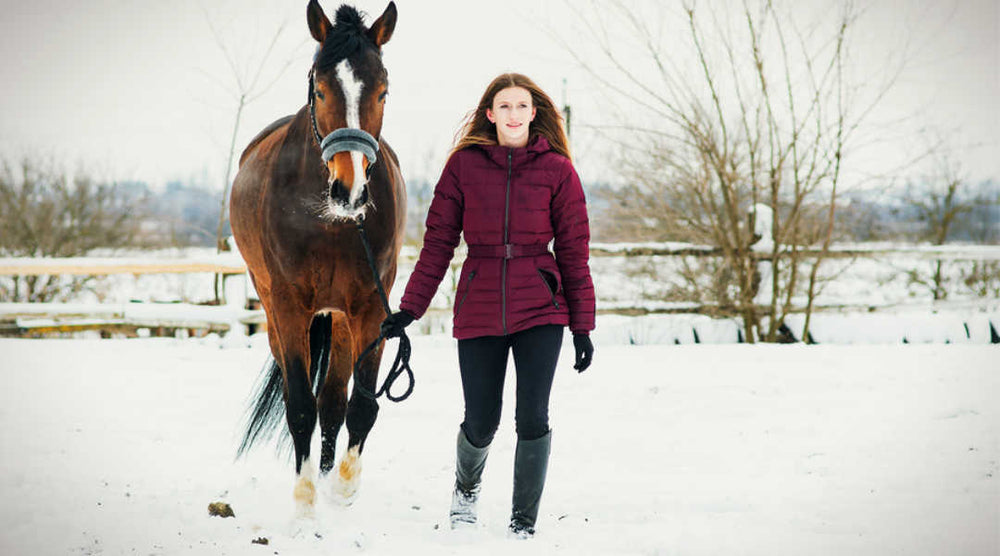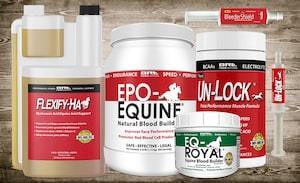
Winter weather adds a challenging element to caring for horses. Not only do you have to deal with issues like frozen water buckets and icy footing, but the presence of winter can also increase your horse’s chance of having a colic episode. Even worse, winter colic episodes are often dangerous impaction episodes, because horses tend to drink less.
The following five tips can help you to prevent winter colic in your performance horse.
Offer Electrolytes
Keeping your horse well-hydrated is an essential step in preventing impaction colic. For horses that drink less in the winter, offer electrolytes. Because most electrolytes contain sodium, they stimulate a horse’s thirst. You can add electrolytes to your horse’s daily feed.
If you’re feeding your horse Un-Lock Advanced Muscle Formula, then he’s already getting a daily dose of electrolytes. Un-Lock contains muscle-supporting amino acids, essential vitamins and electrolytes. With sodium being the first ingredient in the electrolytes, this formula is a great choice if you want to encourage your horse to drink while also benefiting from the muscle support that Un-Lock offers.
Prevent Water From Freezing
If your water is freezing, your horses won’t be able to stay adequately hydrated through the day and night. There are many different ways you can keep water from freezing, from tank heaters and heated water buckets to installing frost-free automatic waterers. For a more economical solution, you can buy water bucket insulators, which extend the amount of time it will take for the water to freeze.
Keep Your Horse Moving
It may be tempting to bundle up your horse and keep him safe in his stall when winter weather hits, but this can actually increase the chance of colic. Movement actually assists muscle function in your horse’s gut, so restricting a horse’s movement in the winter can create issues.
Instead, focus on maximizing your horse’s turnout time, and try to keep him in a regular training program. Even if you need to reduce the intensity of training, your horse will still benefit from shorter rides or training sessions.
Monitor For Ulcers
We tend to change our riding schedules and alter our horses’ turnout during the winter, and these management changes can cause your horse to develop gastric ulcers. Watch for signs of ulcers, such as irritability, lack of appetite and repeated colic episodes, and have your horse scoped and treated for ulcers if you suspect they are an issue.
If possible, offer your horse free choice hay, or divide hay feedings into smaller feedings throughout the day. By keeping forage moving through your horse’s system, you can help buffer his stomach against acid. You may also want to administer a preventive remedy for ulcers, especially if he’s had them before.
Increase Your Horse’s Water Intake
When the weather gets particularly cold, you may want to make your horse’s grain into a mash in order to increase water intake. Adding hot water to grain and soaking it is a good strategy, though you can also soak products like beet pulp or hay cubes for the same benefit.
Colic in the performance horse becomes a growing concern in the winter, but with good management techniques and a little effort, you can reduce the chance of a colic episode.
Learn more about Un-Lock Advanced Muscle Formula and how it can help your performance horse.
Top trainers, owners and competitors rely on BRL Equine products to help their horses perform at their very best. You can get the same great results! Our all-natural equine nutritional supplements really work... guaranteed or your money back!





Also in Horse Tips and More
Top 10 Ways to Show Your Horse You’re Thankful For Him
November 01, 2021
View full article →
5 Ways to Prepare Your Barn For Summer
May 03, 2021
View full article →
Your New Spring Horse Health Checklist
March 12, 2021
View full article →